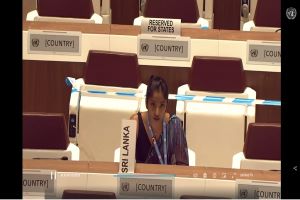
9 August, 2021
Mr. Chair,
We thank you for the draft elements paper on possible consensus recommendations circulated last Friday.
We have been engaged in discussions on technological, legal, military and ethical considerations of the development of autonomous weapon systems in this GGE forum since 2017. Over the years, a growing number of States have repeatedly flagged the alarming consequences of the challenges posed to fundamental IHL principles and humanity by the potential use of autonomous weapon systems and the urgent need for internationally agreed prohibitions and limitations.
During the discussion last Friday, some delegations re-iterated the need for our discussion to be based on the 11 guiding principles adopted in 2019, as reflected in the decision of the High Contracting Parties in 2019 , where it called upon the Group to consider the guiding principles, with a view to further develop and elaborate.
As stated in previous meetings of the GGE, Sri Lanka believes that while the guiding principles may provide a basis for common understanding and a starting point for further elaboration and development, they should not be considered as a process in itself. The Guiding Principles are not meant to be, nor sufficient enough to be the regulatory framework that we seek to put in place to address the complex issues relating to LAWS. A more specific, and substantive legal instrument stipulating clear limitation, both prohibitive and permissive depending on a consensual outcome achieved and positive obligations on States on development and operation of autonomous weapon systems, should be the requirement that we must work towards fulfilling.
It is in this context, that Sri Lanka welcomes the Chair’s working paper as a step forward in our deliberations, providing a solid basis for the Group to agree on forward looking recommendations by the GGE to the Review Conference later this year.
We understand that this elements paper is only a part of the GGE Report to the Review Conference. However, inevitably the contents of this elements paper on possible consensus recommendations will constitute the most important part of the GGE report and as such as is an important starting point.
With regard to the introduction Sri Lanka supports the recognition of the challenges posed by LAWS for the application of IHL, ethical considerations and challenges to international peace and security. We are also pleased to note the recognition of the real possibility of social biases of data sets and therefore the inherent danger of removing the human from the loop. In addition we suggest for consideration of the group to include in the introduction the urgency of this issue. Technological advancements wait for nobody and are on a course of its own. Therefore its important that we appreciate the urgency for preemptive action before the threshold of battlefield use is crossed in view of the serious international and regional security implications on the development of LAWS.
We also recognise your effort to provide for the first time a text on the definition and characterization on LAWS. We re-iterate our position that the issue of definition should not hamper the progress of our work. However, we note that some delegations has concerned in moving forward without having an agreed definition on LAWS. Now that we have a draft text to begin with, it is important to have genuine efforts by States to work on it to agree on a definition, that will allow further impetus to our work..
We welcome the section on General Commitments and appreciate the focus on IHL considerations therein. We suggest a specific reference to ethical and humanitarian issues posed by LAWS in this section given the repeated call by a vast majority of States on the serious ethical and moral implications of autonomous weapons. Decisions on human life are too important to be left to the blunt expedient of a mechanical judgment. A greater emphasis of this fundamental issue and a commitment not to use autonomous weapons inherently unacceptable for ethical and moral reasons should be adequately reflected.
With regard to the section on application of international law , we are pleased to note the reference to the UN Charter, international humanitarian law, international human rights law and international criminal law. Given the possibility of autonomous technology to be used in situations of armed conflicts as well as in law enforcement situations, recognition of the relevance of international human rights law and criminal law is important. Principles of non-discrimination and human dignity are cardinal principles of international human rights law which have a direct relevance to our discussion today.
Mr. Chair,
These are some of our initial thoughts on your paper. We look forward to continue our engagement on specific areas, as we progress our discussion in the coming days, with a view to produce a set of forward looking recommendations.
Thank you.
(ends)